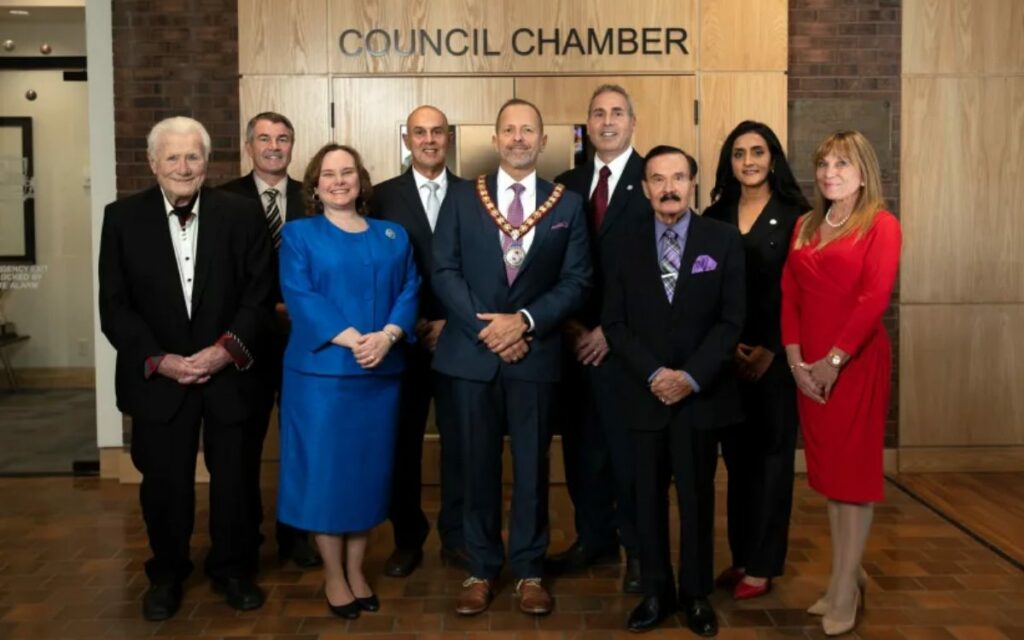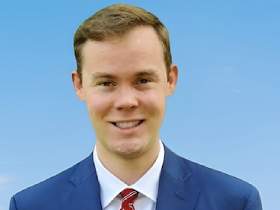
The proposed tax hikes were met with significant opposition from members of the council. Pictured: Niagara Falls Council. Photo Credit: City of Niagara Falls.
We may only be emerging from the dog days of summer but preparations are underway for the 2025 budget for the City of Niagara Falls. The overarching opinion of councillors, at this juncture, is that the initial tax increase suggested by municipal staff needs to be revised.
A preliminary budget outlook report was presented last week, during a meeting of city council. Staff wanted to receive input from members of council on how to construct the budget, based on a one per cent capital levy increase projection, and an operation increase of somewhere between 3.9 and six per cent.
The proposed tax hikes were met with significant opposition from members of the council. In addition to concerns regarding how people are struggling to contend with the current cost of living, The Niagara Region is contemplating raising the annual tax levy by more than eight per cent, worsening an already poor fiscal context.
City of Niagara Falls CAO Jason Burgess, however, provided a more nuanced viewpoint. Burgess explained that recreation and culture, as well as discretionary services, will be where most of the cuts will be made if keeping taxes low is the highest priority. He said that while he is not opposed to reducing the size of the budget, doing so could also have drawbacks.
Tiffany Clark, who serves as the Director of Finance for the City of Niagara Falls, argued in the outlook report that numerous matters must be considered when drafting a budget, including inflation, service and employee contracts, as well as tax increases from the previous fiscal year.
This year’s budget planning also involves an element of ambiguity, because of contract negotiations that are currently taking place with the Niagara Falls Professional Fire Fighters Association, as well as the rapidly expanding population, which has grown by more than ten per cent over the past three years. Tax increases for 2020 and 2021, respectively, were deferred because of the pandemic and put an additional burden on taxpayers in 2023.
Inflation, which is projected to rise by 3.9 per cent, will increase municipal costs by at least $3.5 million. If taxes were to hypothetically increase by seven per cent, a home worth approximately $280,000 would pay an additional $14.64 per month ($175.68 per year), whereas a $500,000 home would see a rise of $26.14 per month ($313.68 per year).
Councillors Lori Lococo and Ruth-Ann Nieuwesteeg expressed interest in pursuing a comprehensive review of the services that are being provided. Lococo would like this evaluation to confirm that there remains a tangible benefit for the community that comes from each item of expenditure. Nieuwestweeg believes that it is possible that the city may not currently be in a financial position to continue providing every service in the same way it has in the past.
Councillor Victor Pietrangelo would like to see the budget tightened so that no more than a five per cent increase is needed. He is skeptical that the range of 3.9 to seven per cent may be too broad, and is concerned that when people look at their taxes, they may not separate the city’s portion from that of the Region, which could be even larger.
Mayor Jim Diodati emphasized the need to find a balance between cutting services and raising taxes. Despite the immense aforementioned challenges, the four-term city leader appears to remain optimistic that a middle ground can be found.
City council has instructed municipal staff to go about preparing numerous options for the budget, accounting for potential revenue sources and service cuts that will cap tax increases at five per cent.

Nick Redekop completed his Honours Bachelor of Arts Degree in Labour Studies at Brock University. He has previously served in municipal and federal politics. In his free time, Nick enjoys following sports, taking part in outdoor activities, and reading biographies. Nick resides in Niagara Falls




















